What It Means to Be an Ally
Use of the term ‘ally’ in relation to marginalized groups is relatively new to me, however, what the term represents is not new.
Being an ally means working in solidarity with a marginalized group that I am not a part of to address systemic inequalities.
I’ve tried to boil down what I feel I have to work at everyday in being an ally (some days more successfully than others!) and have come up with 5 key things I’d like to share:
1) I have to understand my position of privilege
This privilege is something that I have not earned, but received simply because of my characteristics – the way I was born.
When describing this to my six year old daughter, I liken this to recognizing that some of us are playing this game on level 1, while others are on level 5.
There are fewer barriers for me, fewer obstacles in my way and its far easier for me to get to the finish line. This doesn’t mean I haven’t worked hard or that I’ve sailed through life or not met challenges. It just means there are things I don’t have to worry about ever facing because of who I am.
I don’t have to worry about what bathroom I may use in the mall or at work because they have been designated female and male with me in mind.
I don’t have to worry about a job application I put in being set aside simply because of the way my name sounds. I also don’t have to worry about being watched while browsing in a store simply because I am less likely to be viewed as suspicious because of the colour of my skin.
I’ve never had to get through the game at level 5, but it is my job as an ally to find out what its like as best I can, acknowledge and accept that some things are easier for me, and take what action I can to contribute to levelling the playing field.
2) I need to listen and learn.
I need to work to listen to concerns raised by marginalized groups. I need to consider them thoughtfully and recognize that at times my position of privilege can mean experiences sound unbelievable – they are so removed from my reality. Listening receptively can mean a marginalized group and the barrier they face can become more visible.
3) I need to consider my position in making change.
As someone in the dominant group I should not be at the centre of the solution, I should only be a part of it. This means dropping my agenda and my way of change. The marginalized community should be at the centre and I should be there to do what I can to contribute to making it happen.
4) I need to accept that I will mess up and be uncomfortable and that I just have to deal with that.
Being a farm girl, I liken this to crossing a cow filled pasture. If I focus ahead with my eyes on the horizon, I am going to step in it on occasion. When it happens I need to apologise, learn from it, bend down, clean off my boots and keep going.
5) Last but actually most importantly I need to be aware that being an ally is a daily activity I wake up and commit to doing – not a title or certificate I earn.
It is a verb not a noun.
So as I move forward in my work as an ally for the LGBT community, the Aboriginal community, or other marginalized groups I will work:
- to recognize my privilege;
- to listen;
- to find my appropriate place in driving change;
- accept I will mess up and I should learn from it; and
- keep trying
If you notice me step in something, I welcome you bring it to my attention so I can apologize, clean off my boots and continue to learn.
In writing this I read several sources. I’d recommend this blog post if you would like to read more or if you’re short on time, this 3 minute video is engaging and concise. It might be a good one to share with students.


